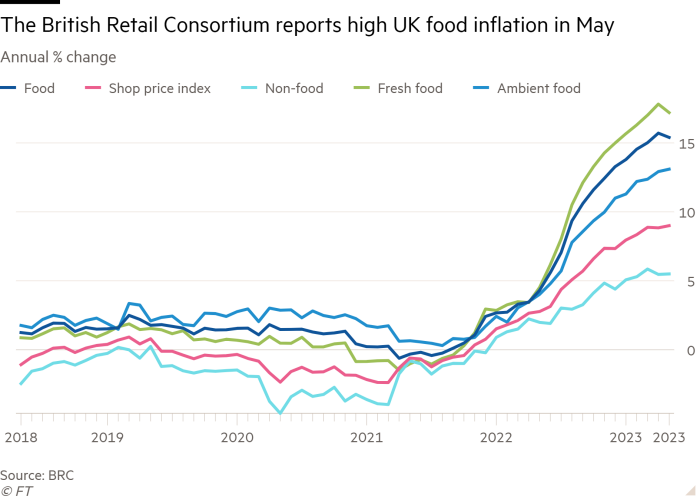UK shop price inflation reached its highest rate for at least 18 years in May, despite the pace of food price growth marginally easing, according to new sector data.
The cost of shop items rose at an annual rate of 9 per cent last month, up from 8.8 per cent in April, marking the fastest increase since the British Retail Consortium (BRC) records began in 2005, the trade body said on Tuesday.
However, food inflation decelerated slightly to 15.4 per cent in May, falling from an all-time record high of 15.7 per cent the previous month.
Consumer price growth has accelerated since Russia’s invasion of Ukraine in February 2022 which resulted in spiralling energy and food prices globally.
Helen Dickinson, BRC chief executive, said that “while overall shop price inflation rose slightly . . . households will welcome food inflation beginning to fall”.
She added that the slowdown in food price rises was largely driven by lower energy and commodity costs starting to filter through supply chains and reduce inflation on some staples including butter, milk, fruit and fish.

But the price of chocolate and coffee rose off the back of the high global costs for these commodities. These pushed inflation for ambient food — items that can be stored at room temperature — to 13.1 per cent in May, from 12.9 per cent in the previous month.
Food inflation affects the poorest households hardest as they tend to spend a larger proportion of their budget on essentials.
Mike Watkins, head of retail and business insight at NielsenIQ, which helps compile the data, said that to mitigate the rising cost of living, shoppers were looking out for seasonal promotions and supermarket loyalty scheme offers.
Data published last week showed that food sales volumes were down 2.7 per cent from their pre-coronavirus levels in March as consumers cut back on purchases in response to higher prices.
The BRC also reported that non-food inflation rose to 5.8 per cent in May, up from 5.5 per cent in the previous month, despite outlets offering heavy discounts on footwear, books and home entertainment.
The BRC data suggested that the price growth of food and non-alcoholic beverages remained high.
In April, official food inflation was 19.1 per cent, only marginally down from a 45-year high of 19.2 per cent registered in the previous month, according to the Office for National Statistics data released last week.
Overall inflation fell less than expected to 8.7 per cent from 10.1 per cent in the previous month, boosting expectations that the Bank of England will raise rates further to curb inflation.





